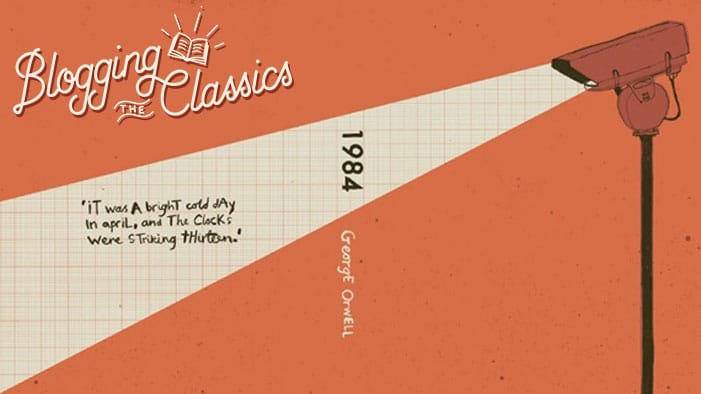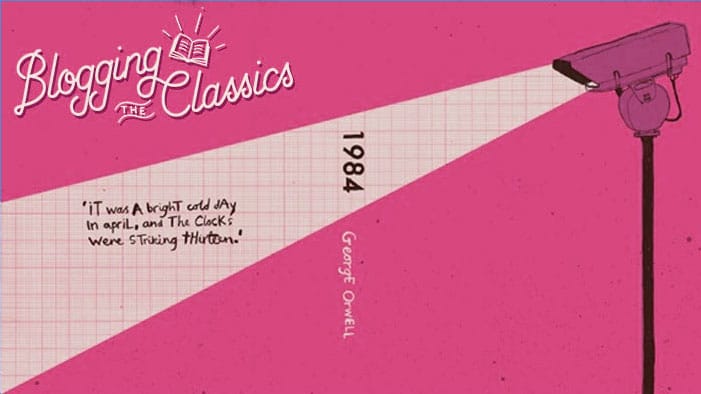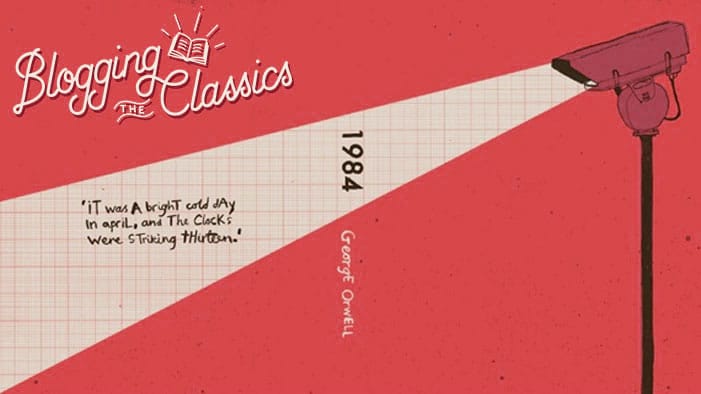Blogging 1984: IX (Part 2, Chapter 10, OH NO)

Previously in Blogging 1984, Winston and Julia dove into Goldstein’s manifesto, and I would rather date a poli-sci student than go through that again.
Winston wakes in the bed in Mr. Charrington’s shop after a long post-Goldstein nap to hear the washer woman keeping on with her charming cockney songs in the courtyard, just hanging out laundry and singing 24/7. Although the clock says it is 8:30 p.m., the light outside is funny; the sky looks washed, “so fresh and pale was the blue between the chimney pots.” It’s cold. I’m sure everything is just fine, though. Everything we know about clocks and 1984 and unseasonal chills suggests it’s just fiiiiine—“It was a bright, cold day in April, and the clocks were striking thirteen.”
Looking down upon the singing prole, her “thick arms reaching up for the line,” Winston notes “her powerful mare-like buttocks” and it strikes him “for the first time that she was beautiful.” Incidentally, the washer woman and her powerful mare-like buttocks would like to be excluded from this narrative, one that she never asked to be a part of.
Julia notices that the stove is out of oil—funny, she was sure there had been enough. Winston isn’t bovvered, and ruminates a little longer on the sky:
“It was curious to think that the sky was the same for everybody, in Eurasia or Eastasia as well as here… people… held apart by walls of hatred and lies, and yet almost exactly the same—people who had never learned to think but were storing up in their hearts and bellies and muscles the power that would one day overturn the world. If there was hope, it lay in the proles. Without having read to the end of the book, he knew that that must be Goldstein’s final message.”
Look, that probably is the gist of it, and far be it for a website designed to help you understand a novel intimately in minimal time to tell you to just DO THE READING, but maybe Winston could have had a flick through to the end of the book in amongst all the naked coffee drinking to find out for sure?
Winston is still thinking about the washer woman:
“in the villages of the endless Russian plain, in the bazaars of China and Japan—everywhere stood the same solid unconquerable figure, made monstrous by work and childbearing, toiling from birth to death and still singing.”
What a beautiful sentiment, other than the harsh #mombod vibes. Did Bono write that? Michael Jackson? Ghandi? It’s beautiful.
Coolly, casually, Winston says to Julia, “We are the dead.”
” ‘We are the dead,’ echoed Julia dutifully.
‘You are the dead,’ said an iron voice behind them.
There is a telescreen hidden behind the flimsy picture on the wall.
In short order, Winston and Julia are instructed by the voice to stand back to back, and there are the sounds of boots trampling the yard, and something being dragged across the stones; related, “The woman’s singing had stopped abruptly.”
The iron voice sings part of a folk song like a demented clown, and then a ladder crashes through the wall, followed by an influx of truncheon-wielding Thought Police. Someone picks up the glass paperweight and smashes it:
The fragment of coral, a tiny crinkle of pink like a sugar rosebud from a cake, rolled across the mat. How small, thought Winston, how small it always was!
†RIP glass paperweight metaphor 1984-1984 â€
One of the soldiers punches Julia, then hoists her onto his shoulder and carries her out, and “that was the last he saw of her.”
The biggest surprise is yet to come, as Mr. Charrington enters the room—or, to be more correct, the undisguised face of the man who had pretended to be the old Mr. Charrington, but is in fact about 35, without wrinkles, and with black hair. My general feeling is of queasiness, not unlike the moment in Labyrinth when Sarah realizes she has been hanging out in a fake bedroom in a monumental pile of garbage. What level of deceit went into creating a fake antique store and populating it with pleasing literary motifs, waiting patiently for a plebe to purchase a diary, and slowly awaken, then carry on lovers’ trysts multiple times in the upstairs bed over a period of months, only to blow the cover by busting through the wall? It just seems so elaborate, in terms of startup costs. Can Mr. Charrington reuse the antique shop to trap another Inner Party rebel? I don’t know! I mean he’s one paperweight down after all this and don’t even ask me about the state of the wainscoting after the ladder incident.
If I am to take a lesson from the events of the past few chapters, it’s that learning the Ultimate Truth almost never pans out. Consider:
- Adam and Eve: Evicted for eating from the Tree of Knowledge. (I would have at least hit up the BAKERY OF KNOWLEDGE if I was going to get kicked out, right?)
- Bruce Willis in The Sixth Sense: Was perfectly happy being unknowingly dead until Haley Joel Osment showed up and dropped knowledge on him.
- Jafar: Is sucked into a lamp in a cloud of red egotism after wanting too much.
- Ned Stark: Finds out who killed Robert Baratheon, winds up headless, setting in motion the slaughter of a) his family, and b) more damningly, several direwolvesðŸº.
- Smeagol: A L’Oréal study in what happens when you cannot even with Ultimate Truth (initially fine lines, and then flesh melting off your bones).
- Cate Blanchett in Indiana Jones and the Kingdom of the Crystal Skull: Perhaps the most illustrative example of why knowledge is bad, Cate’s eyeballs burst into flames as she gets a glimpse of a super-derivative alien/the fate of film franchises in general.
Ughhhhh, what did Winston even achieve in the ten seconds he was awake and lucid? Nothing. He had some real coffee and real chocolate, and he practiced some non-puppetic sex with Julia. He killed no one, recruited no one, just wandered London Towne with his thoughts and feelings and then immediately—immediately!—got caught. If you gave Winston the One Ring, he would have busted out a mournful song in the dining room of the Prancing Pony and then been straightaway picked up by a band of Dark Riders.
Orwell goes on and on (see: Goldstein’s book) about the symbolic victory of knowing how the world works, of understanding the shackles that bind us all on an intellectual level, and indeed this chapter/part 2 of the novel ends with yet another invocation of Knowledge—
“It occurred to Winston that for the first time in his life he was looking, with knowledge, at a member of the Thought Police.”
—but I feel like I’ve been sold a faulty premise. When does Winston put an arrow in Big Brother’s heart before an audience of millions? When is the ominous dictator behind a delusion as large as the world vanquished into a fetal giblet and left to rot in the Forbidden Forest? Did we really come this far only to find the cold solace of theoretical Marxism? (Yes.)
Next time in Blogging 1984: Winston’s ulcer returns.
Notes:
- How disappointed do you feel on a scale of 1 to 10 about the curtailment of Winston’s rumspringa? Before you answer, remember how angry everyone got at Katniss being unconscious through the Capitol siege in Mockingjay, and then consider than 99% of this book has been a running commentary of Winston thinking to himself and performing clerical work at the Ministry of Truth.
- Someone offers you a book that contains Ultimate Truth (not The Secret): do you read it?
- Your weekly dose of actual 1984:
Find all of Janet’s 1984 blog here, and find our Blogging the Classics index page here.















